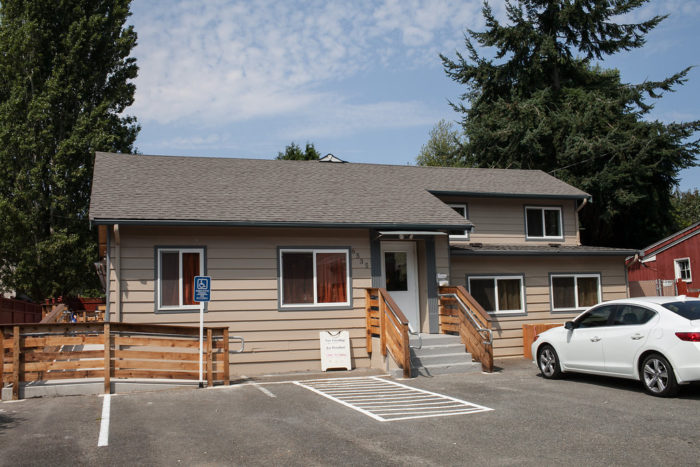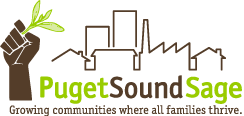On October 1st, 2018 the Seattle City Council voted to require the City to prioritize publicly owned property for affordable housing. We believe this policy can help further community control of land as a solution to our current displacement crisis. But first, a little history.
Puget Sound Sage, in coalition with our community partners in South CORE, has been fighting for community controlled and inspired development in the Rainier Valley and throughout the region. Back in 2015, when the City of Seattle was updating its comprehensive plan we fought for the inclusion of a displacement risk analysis that would help us evaluate how our growth and development policies might exacerbate the risk of displacement for low-income communities and people of color. Unsurprisingly, the results from the analysis showed that any growth scenario the City decided on would only further increase displacement risk. So, alongside community based groups in the Rainier Valley (Homesight and Rainier Beach Action Coalition), Chinatown/ International District (SCIDPDA and the Wing Luke Museum), and Central District (Black Community Impact Alliance and Africatown) we demanded that the city respond to this finding. This group came together and formed a coalition called the Race and Social Equity Taskforce (RSET). As communities in historically redlined neighborhoods, with continued disinvestment, and now significantly increased displacement risk we needed strategies to both prevent displacement and also invest in creating new job opportunities, improved educational outcomes, and other forms of community development. And so the Equitable Development Initiative was born!

RSET worked with the Office of Planning and Community Development (OPCD) to create both the Equitable Development Initiative (EDI) and investment strategy that lifts up community driven development projects in neighborhoods with high displacement risk, invests in community organizing and capacity building, and works towards taking land off of the speculative market.
In 2016 we urged the Mayor and Council to allocate funds to make these projects a reality and the Mayor put $16 million from the sale of Civic Plaza — the pit across the street from City Hall– towards funding the EDI. Thanks to that major investment, our vision for community driven development now had seed money. OPCD hired Sage’s own Ubax Gardheere to run the program, who then created an advisory board to help determine how the money should be spent, hired staff, and built capacity to institutionalize this program within the City.
The advisory board and EDI staff spent the greater part of a year building out the program and determining criteria for EDI investments and how funding decisions should be made, all with the goal of ensuring that communities most impacted by displacement are at the decision making table and directly benefiting from these investment. Outcomes from this time intensive process include:
- Funding criteria that prioritizes groups led by communities of color in neighborhoods with high displacement risk,
- Creating new funding procedures that actually fund emerging groups who may not have a strong track record, building capacity to become developers and landowners, building capacity to engage directly with community, all with the promise of long-term funding.
- We are proud of the fund we helped develop and believe that it helps shift us away from business as usual — where well-funded groups receive city funds because they are well established and have a strong track record to more transformative investments – building capacity, redefining risk, and supporting community self-determination.
In 2018, the EDI advisory board allocated $5.5 million to ten projects and has already seen the fruits of our labors. Only a few months after receiving their funding, the Refugee and Immigrant Family Center – a group that provides culturally relevant daycare for immigrant and refugee families- who were facing displacement, utilized their EDI money to buy their building and now have site control.
The thing with community development is that you need money, but you also need land. We’re working on a permanent source of funding for the EDI (more on that soon!), but recognize that land is a resource in short supply. The escalating land costs we’re seeing in the region make it harder to develop affordable housing, harder for communities to buy and hold land, and harder to stay in place when developers continue to seek profit over people. In this current crisis, publicly owned land plays an increasingly significant role in preventing displacement. Which gets me back to the policy passed by City Council on October 1st.
Councilmember Mosqueda’s policy, passed by council unanimously, requires that city owned property be prioritized for affordable housing and allows the city to discount the cost of the land for affordable housing development. Moreover, in neighborhoods with high displacement risk, this new policy follows the lead of the EDI to give community accountable groups priority in buying the land from the city. AND any land that generates revenue for the city, 80% of the proceeds will go back to fund affordable housing through the Office of Housing and some will further support the EDI.
All in all, the policy passed beautifully complements the Equitable Development Initiative and we look forward to seeing the innovative projects we build together.
For more information contact Giulia Pasciuto – giulia@pugetsoundsage.org
